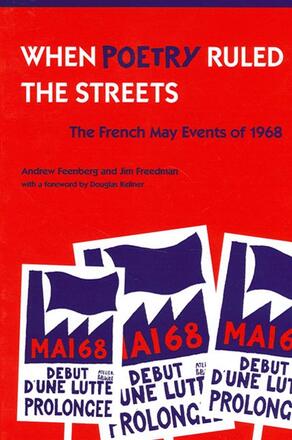
When Poetry Ruled the Streets
The French May Events of 1968
Alternative formats available from:
Offers a complete survey of the French May Events of 1968 through narrative, analysis, and documents.
Description
More than a history, this book is a passionate reliving of the French May Events of 1968. The authors, ardent participants in the movement in Paris, documented the unfolding events as they pelted the police and ran from the tear gas grenades. Their account is imbued with the impassioned efforts of the students to ignite political awareness throughout society. Feenberg and Freedman select documents, graffiti, brochures, and posters from the movement and use them as testaments to a very different and exciting time. Their commentary, informed by the subsequent development of French culture and politics, offers useful background information and historical context for what may be the last great revolutionary challenge to the capitalist system.
Andrew Feenberg is Professor of Philosophy at San Diego State University. He is the author of Lukács, Marx and the Sources of Critical Theory; Critical Theory of Technology; and Alternative Modernity: The Technical Turn in Philosophy and Social Theory. He is the coeditor of Marcuse: Critical Theory and the Promise of Utopia (with Robert Pippin and Charles P. Webel) and Technology and the Politics of Knowledge (with Alastair Hannay). Jim Freedman is Professor in the Department of Anthropology at the University of Western Ontario. He has authored or edited many books, the most recent of which is Transforming Development: Foreign Aid for a Changing World.
Reviews
"This book is fascinating to read. The May events in France are very important. They are open to numerous interpretations but certainly they provide the only example of a government of an advanced industrial society brought to its feet, if only for a couple of weeks. They resonate backwards with the history of revolutions and forward to 'the new social movements' and the upheavals and reorganizations in Europe that continue to this day. " — Mark Poster, author of Existential Marxism in Postwar France: From Sartre to Althusser
"I know of no other book quite like it. It authoritatively captures an important moment in twentieth-century history, and does so with real verve and flair. I could not imagine teaching the sixties without recourse to it. " — Paul Thomas, University of California, Berkeley